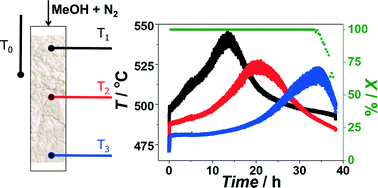The importance of heat effects in the methanol to hydrocarbons reaction over ZSM-5: on the role of mesoporosity on catalyst performance†
Abstract
Interpretation of catalytic performance during the MTH process is hampered by heat transport phenomena. We demonstrate that large temperature rises can occur during fixed bed labscale catalyst testing of ZSM-5, even when a large catalyst bed dilution is applied. Formation of mesopores in ZSM-5 leads to partial mitigation of these effects because of a lower generation of heat per unit catalyst volume and weakening of the zeolite acidity.


 Please wait while we load your content...
Please wait while we load your content...